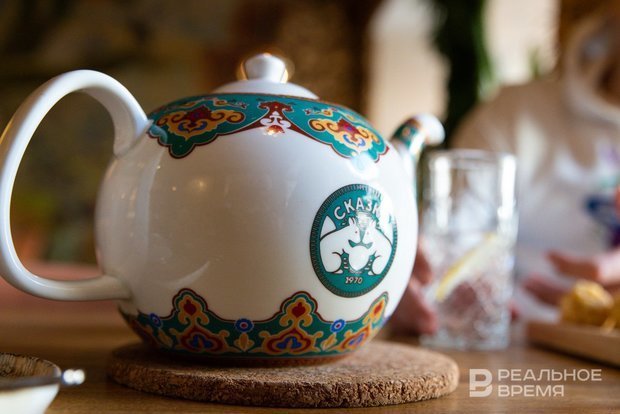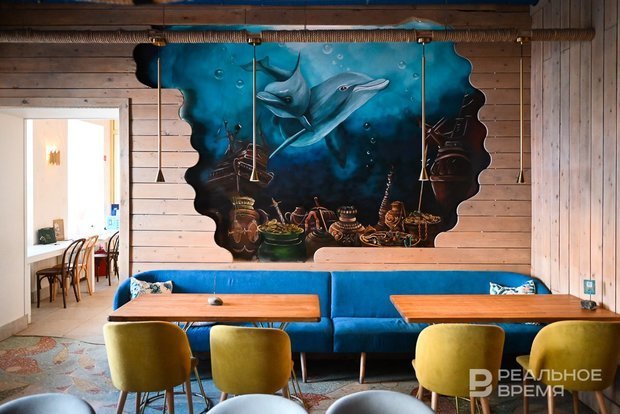Mikhail Sharipov: ‘Today for a restaurateur working ‘dirty’ is no longer comme il faut, and inefficient’
Fake reviews, gossiping waiters and other methods of unfair competition in the restaurant environment

There are more than a thousand catering establishments operating in Kazan today, this is a huge competitive field. In his author's column for Realnoe Vremya, Chairman of the board of the Association of Restaurateurs and Hoteliers of Tatarstan, founder of MemSol restaurant group (Skazka family restaurant, CubaLibre in Kazan, and SeasLoc in Innopolis) Mikhail Sharipov talks about competition between restaurateurs. He also describes the methods of unfair competition that he has encountered throughout his career. He states: times have changed, and any restaurateur understands that friendly communication in a professional environment works only as a plus, and “cunning” and trying to get guests at someone else's expense — it has never worked in the long run.
“Any competition is a positive factor”
How many restaurants do you think there were in Kazan in 1987? Eight for the whole city. In Moscow — twice as many, as many as seventeen. I'm not talking about canteens and not about cheburechnye — about real restaurants where you could have a nice evening with a delicious dinner. Can you imagine how empty and lifeless this field of complete lack of competition was?
Now there are more than a thousand catering establishments in Kazan alone. Needless to say about Moscow. Competition in the restaurant market is growing and will continue to grow. To be honest, I was afraid of it up to a certain point. Every time a new institution opened nearby or a project that intersected with us in concept appeared somewhere in the city, I felt apprehensive: how much more? There are already too many restaurants in Kazan!
But now I understand perfectly well: any competition is a positive factor. It is the main factor in the development of the market, and it ultimately makes all its participants better. It is necessary to be able to develop in conditions of high competition and with its help.

According to Bloomberg estimates, the restaurant business is in third place in terms of risk level. Anyway, sooner or later all restaurateurs make mistakes. Unsuccessful projects happen even for the most experienced — it's like driving a car in a megalopolis: sooner or later a road accident awaits every real driver. At the same time, in the niche of premium restaurants, the price of error is very high. The most expensive resource in our world is time. Thus, not even money, but the time spent by a guest in a bad restaurant is a significant loss for him. And the more premium your audience is, the less you have the right to make a mistake. Wealthy people are very busy, they don't have time to give you a second chance. If they don't like it, they won't come back — your competitors always have something to offer them.
It is also necessary to work on the competitiveness of “tourist places”
Restaurants that are located on passing tourist streets, as a rule, have a large turnover. And in establishments that work in residential areas, there are more regular guests. Accordingly, the right to make a mistake in these two categories was completely incomparable until recently. By the way, our restaurant now has a percentage of tourists — about 60, and ten years ago it was more than 80%. We are doing a lot to ensure that the share of regular guests from Kazan grows.
We ourselves do not consider Skazka as a tourist destination. At least because this phrase does not always have a relevant connotation (translated from Russian as “A Fairy Tale” — editor's note). After all, when we come to an unfamiliar city, we are looking for “places for locals”. This is largely due to the latent desire of the tourist to come to a proven place that consistently holds the brand and which is “tested for strength” by local residents every day.
Personally, I do not know restaurateurs who would say: “I have a tourist place, I will earn in any case, dissatisfied guests will leave, new ones will come.” A new time has come, the price of an error has multiplied. Because every second (if not every first) tourist, before entering a restaurant, will first look at the reviews left on online platforms. This means that it becomes even more interesting to compete with colleagues: now it is no longer enough just to stand in the most passable place and have a recognisable sign. Now you need to work so that the guests remain satisfied with you and leave positive reviews.

Phenomenon of online platforms to people
Platforms where anyone can post a review and evaluate the place started working about 20 years ago. And we felt their influence on ourselves in 2008, when, without knowing it, we entered the top 3 restaurants of Kazan on a very popular Western resource for travellers. At that time, it was still a truthful resource, and few people thought of making it an instrument of unfair competition.
But after a while, we suddenly received a letter that said something like the following: “You abuse reviews, write your own eulogies, and that's why we shifted you from fifth place to fifteenth, thank you for being with us!” We studied the situation — all the reviews there were completely adequate and appeared quite logically: by that time, the New Year holidays, traditionally high season, had just passed. Naturally, during such periods, a lot of reviews immediately appear on the platform in a short time, and most of them turned out to be positive.
When we began to take a closer interest in this story, we learned that it was time to pay for advertising on this resource long ago in order to stay in high places in search results and with a good rating. Interestingly, the management of the service has always denied this, but the fact remained: you pay for advertising — and for some reason you grow in the “truthful rating compiled from the reviews of visitors”.
Then other large resources began to be added: the most popular search engines, both Western and domestic, began to include the evaluation of places. We tried to work with every review. If they saw negative ratings, they could kill half a day to work out the mistake and find out who served the patient so badly. At about this time, an external marketing team told us: “Guys, actually, in order for you to rise in search engines, it's better to help your competitors' ratings fall.” Only then did we realise that some of the reviews that were written on the restaurant may not be real. That fake reviews of your restaurant (positive) and competitors' restaurant (negative) have become part of the marketing strategy for some unscrupulous market players. If desired, they can be refuted, but different platforms approach this in different ways. Sometimes it happens. The most concrete argument is to prove that the author of the negative opus was not really at our place at all.

How to recognise fakes about a restaurant
I'll give an example. We write something like this under each negative review: “We apologise, this is an unacceptable level of service for us. Here are our contacts, please contact us to clarify the details.” And no one contacts us. This is the first, but not the last sign that the review is really fake.
Another important sign is the simplest possible text: “I went into a restaurant, the service was terrible, the waiters had gloomy faces, the food was tasteless.” Not a single detail — the author does not disclose what the “horror” of the service was, what exactly tasteless he ate, and what kind of waiter served him.
But it also happens that the fake is replete with details that give deceivers away. For example: “I ate a burrata, it was completely unintelligible.” And we don't even have burrats on the menu. Or “They make disgusting cheesecake in this place” — and we haven't made cheesecake for five years.
But technologies are developing, including technologies of unscrupulous competitors. Citizens who traded in such fakes at one point began to realise that, most likely, the review would be cancelled by the website. Therefore, now they study the menu, clarify the details in advance, and only then write customised reviews. In these cases, it is really difficult to distinguish the truth from the fake. Moreover, even if you study the profile of the writer, it will not arouse suspicion: there will be other reviews in it, it does not look empty and just created. This is a whole industry, “workers in it” are recruited, including through ads of the “Quick Earnings on the Internet” format. This earnings often consist precisely in that a person must create and promote dozens of fake profiles, and then scribble unfair reviews about a variety of institutions — competitors of customers. They will be very similar to the real ones, and the rating of such a profile will only strengthen. So marketing technologies are developing.

A couple of years ago, we had another interesting story: the manager calls me and says: “Mikhail, we have a problem. We have reviews. The same ones, by pattern. And they are positive! Even the rating on the platform has risen, but it is evident that the reviews are not real. What should we do?" We started to figure it out. We saw that the same reviews appear in the account of CubaLibre, our second institution. Moreover, all of them are quite standard and soulless: “A cool institution, they cook delicious — five.” We complained about them to the platform to immediately make it clear that this is not our “marketing activity”. By the way, the site removes good reviews in one fell swoop on our application, there is nothing to prove.
We started to investigate this topic, and it turned out that this is also a marketing ploy in the field of unfair competition, and quite sophisticated — it uses the natural distrust of people. If a person sees entirely good reviews about a restaurant written as a blueprint, he does not believe them and goes to look for a more “plausible” place. At the same time, you go up on the site according to the rating, but for some reason guests do not come to you. The psychology of a person is so arranged that he does not trust the perfect picture. There should be a balance.
“Non-electronic” methods of unfair competition
Certainly, unfair competition is not limited to fraud with reviews on online platforms. I remember one unpleasant episode — it happened not in Kazan, with our colleagues in another city and even a region of Russia. Two similar restaurants appeared in one niche. The management of one of them decided that all means are good in war. Their waiters directly told visitors about the competitors' restaurant: “You don't go there, it's some kind of eatery.” Then they started attacking competitors with fake complaints, after which a wide variety of checks began to come to the restaurant regularly, from the fire service to Rospotrebnadzor. Then they staged an information attack through the media. To the credit of the attacked, they first lost heart, but then they found the way out: they did not rename themselves, kept the concept, proved who they really were with patience and quality of work. However, in total, as a result of the activities of such a “wonderful neighbour”, they sank for about a year.
There is another interesting way that indirectly works for competition — you can't call it dishonesty, in fact, but I will mention it anyway. I am talking about the artificial creation of hype. It is often resorted to by popular restaurants, including the owners of Michelin stars. You call the restaurant. It's not the season, the day is rainy and dull. They tell you: “Excuse me, please, we have all the tables reserved. But you can leave your phone number, if something becomes available, we will definitely call you.” You are sad, you leave your phone number, and after a couple of hours they call you to please you with the news: “There is a place for you, we can record you for this period of time.” Of course, no one thought to book your table before that — but you get the full impression that today you managed to get among the favourites!

The concept of unfair competition is very subtle. There are people who see only black and white. But there are many facets between them. Let's take, for example, Switzerland — what is legal there we will obviously attribute to unfair competition, and even with the involvement of the authorities. For example, the authorities of Swiss municipalities may not grant permission to conduct restaurant activities if you plan to set lower prices in your institution than in the surrounding ones. In our country, this would immediately be called the artificial influence of the authorities on pricing. And they have this completely legal regulation — other restaurateurs have been developing for many years, invested money in this area and its improvement, their income and passability should be protected and should not be exposed to the danger of dumping. So, the price bar in the Swiss cantons is kept at the level of municipalities. When you try to open a business there, you will be checked on how your activities will affect the business of people who already work there. Such a story is unthinkable in our country — only the player himself determines his business model, and the competition will show whether he is on the right path.
In short, there are many methods of competition, and they can be very different.
“The Russian market is getting civilised”
We clearly see the trend: the Russian market is becoming more and more civilised. If in the 1990s and 2000s businessmen did not hesitate to use the strangest methods of competition, today almost everyone tries to work in an ethical manner. In the Association of Restaurateurs and Hoteliers, we speak to each other at all meetings: “We value fair competition, and we do not use unfair methods.”
Time is passing, restaurant ethics is developing. Ethics of customer service, conducting negotiations, compiling speech modules. And, of course, the ethics of competition. The paradigm is shifting a lot, today for a restaurateur working “dirty” is no longer comme il faut, and inefficient.
Again, the restaurant business is one of the most developed in Russia today. The level of service, the level of product quality, the level of cooking — all this is at a very decent level in our restaurants and cafes. Of course, there is room for improvement, we have a lot of goals and objectives, and there are also enough problems.

The market has become so multifaceted and so professional that we help each other. When one of us needs something, starting from ice in the summer and ending with dishes for themed parties, we always go to each other for help. We share information and tips. Eighty percent of market players understand that the more we pull each other up, the stronger the market.
It is pleasing that fair competition has reached the point that in one institution you can be recommended where to go after them, because “it's cool there too.” And everyone has also realised that the more educated the consumer becomes, the more difficult it becomes to deceive them.
And how is it right?
How then to compete in the modern business field? After all, there are many establishments appearing in Kazan, the competitive environment is growing. The answer to this question is very simple. For me, everything became very clear when I read the book by Kim Chan and Rene Mauborn, Blue Ocean Strategy. HoReCa is a brown ocean. But you can always find blue inside it.
Because as soon as we ourselves understand what value we create and what is its uniqueness, we immediately have our own audience that transmits information via word of mouth (the most reliable source), and thanks to this we develop. In short, everything works that way.
That is, yes, you can really open 20, 30 or even a hundred restaurants of Tatar cuisine in Kazan. To get along with each other, everyone will develop their own unique facet. The main thing is that the restaurateur actively thinks, is not only creative, but also hardworking, and day after day creates a concept and develops it. And competition is the best and natural driver of development!